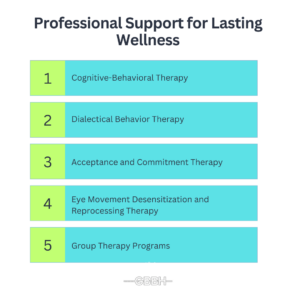Mental illness affects millions of people worldwide, and understanding what causes it is crucial in finding ways to prevent and manage it. Mental health disorders can stem from a variety of factors, and while some may not be entirely preventable, there are strategies and therapies that can help improve mental well-being. In this blog, we’ll explore the causes of mental illness and discuss possible prevention methods through various mental health programs and therapies.
Causes of Mental Illness
1. Biological Factors
One of the primary causes of mental illness is biological. Mental disorders can run in families, suggesting a genetic link. If a person has a family history of mental illness, they may be at a higher risk of developing conditions like depression, bipolar disorder, or schizophrenia. Additionally, imbalances in brain chemistry, particularly with neurotransmitters like serotonin and dopamine, can also contribute to mental health disorders.
Hormonal changes, brain injuries, and even physical illnesses can disrupt mental health. In such cases, seeking help from a mental health treatment center or other specialized locations can be vital for managing symptoms.
2. Environmental Factors
The environment in which a person grows up or lives plays a significant role in their mental health. Exposure to trauma, abuse, or neglect can increase the risk of developing mental health issues. Poverty, violence, and a lack of social support can also create a breeding ground for conditions like anxiety, depression, and post-traumatic stress disorder (PTSD).
For individuals affected by trauma, engaging in a trauma therapy program or EMDR therapy (Eye Movement Desensitization and Reprocessing) can help process and heal from past experiences.
3. Psychological Factors
Mental illnesses can also be linked to psychological factors such as negative thinking patterns or an inability to cope with stress. People who struggle with low self-esteem or who tend to blame themselves for their problems may be more prone to mental health disorders.
Cognitive-behavioral therapy (CBT) is an effective way to challenge these negative thought patterns. It helps individuals develop healthier ways of thinking and responding to life’s challenges, which can reduce symptoms of mental illness.
4. Social and Cultural Factors
Social isolation, discrimination, and cultural stigma around mental health can prevent people from seeking the help they need. When individuals feel like they are not accepted or valued by their community, they may experience feelings of loneliness and worthlessness. These feelings can spiral into conditions like depression or anxiety.
A group therapy program offers support by allowing individuals to connect with others who are going through similar struggles. This form of therapy helps build a sense of belonging and shared experience, which can be incredibly healing.
Can Mental Illness Be Prevented?
While not all mental illnesses are preventable, certain actions can be taken to reduce the likelihood of developing a mental health disorder or manage symptoms early on. Here’s a closer look at how preventative measures and mental health programs can support mental well-being.
1. Developing Resilience: Building a Strong Emotional Foundation
- Resilience-Building Therapies: Techniques used in Dialectical Behavior Therapy (DBT) focus on emotional regulation, distress tolerance, and mindfulness, which can help individuals cope with stress and negative emotions more effectively.
- Strengthening Problem-Solving Skills: Learning constructive ways to address challenges and practicing healthy coping skills through therapies like Cognitive Behavioral Therapy (CBT) enhances resilience, allowing individuals to adapt to adversity and prevent escalation into more severe issues.
2. Recognizing Early Signs and Symptoms
- Early Intervention Through Structured Programs: Intensive Outpatient Programs (IOP) and Partial Hospitalization Programs (PHP) allow individuals to access professional support when symptoms first appear. Addressing issues early can prevent conditions from worsening and aid in a smoother recovery.
- Self-Awareness and Regular Check-Ins: Recognizing early symptoms of mental health changes—like persistent sadness, anxiety, or mood swings—allows individuals to seek support proactively. Regular check-ins with a mental health professional can make a significant difference.
3. Cultivating Social Support Networks
- Building Supportive Connections: Positive social networks, such as family, friends, or community groups, can act as protective factors against mental illness. Engaging in Group Therapy Programs can also be beneficial for creating new supportive relationships.
- Community Engagement: Being active in community groups, social circles, or support groups provides a sense of belonging and purpose, which are crucial for mental well-being.
4. Practicing Healthy Coping Strategies
- Adopting Stress-Relieving Activities: Activities like mindfulness, exercise, and hobbies support emotional stability. Acceptance and Commitment Therapy (ACT) teaches individuals to accept their emotions and respond constructively, reducing stress responses over time.
- Therapeutic Intervention: Engaging in Mental Health Therapy Programs provides tailored coping strategies. CBT, DBT, and ACT offer specific techniques that help individuals manage stress and improve resilience.
5. Addressing Trauma Early and Effectively
- Processing Trauma Safely: For those with trauma, addressing it through Trauma Therapy Programs and methods like EMDR Therapy can reduce its long-term impact on mental health.
- Seeking Professional Help: Trauma should not be faced alone. Working with therapists trained in trauma-specific techniques can help individuals process and reframe past experiences, which can prevent conditions like PTSD and depression.
Mental Health Programs for Prevention
Incorporating mental health programs into one’s lifestyle can greatly reduce the risk of developing mental illnesses. These programs often include a variety of therapies, such as group therapy programs, cognitive-behavioral therapy, and trauma therapy programs, that focus on building resilience, emotional awareness, and coping strategies.
A mental health treatment center, for example, offers various programs tailored to different needs, from individual therapy to specialized trauma care. Taking part in such programs can help individuals learn how to manage stress, process emotions healthily, and create supportive social connections—all of which are crucial for mental health.
Treatment and Recovery: Professional Support for Lasting Wellness
For individuals dealing with mental health challenges, many treatment options are available. Mental Health Programs and therapy options provide structured, supportive environments for managing symptoms and achieving stability. Here’s a brief look at some of these therapeutic approaches:
- Cognitive-Behavioral Therapy (CBT): A widely used therapy that helps individuals change unhelpful thinking patterns and behaviors.
- Dialectical Behavior Therapy (DBT): Focused on emotional regulation and distress tolerance, DBT is highly effective for conditions involving intense emotions.
- Acceptance and Commitment Therapy (ACT): ACT helps individuals embrace difficult emotions and commit to positive changes in behavior, enhancing resilience and reducing stress.
- Eye Movement Desensitization and Reprocessing (EMDR) Therapy: EMDR is especially effective for trauma, helping individuals process disturbing memories and reduce their emotional impact.
- Group Therapy Programs: Group therapy provides a supportive community where individuals can connect, share experiences, and learn from others facing similar challenges.
Conclusion
Mental illness can be caused by a complex mix of biological, psychological, environmental, and social factors. While it may not always be preventable, there are steps that individuals can take to reduce their risk. Participating in mental health therapy programs, receiving early intervention, and seeking help from a mental health treatment center in Massachusetts can make a significant difference in one’s mental health journey.
Therapies like cognitive-behavioral therapy, dialectical behavior therapy, acceptance and commitment therapy, group therapy programs, and trauma therapy programs are proven methods that can both treat and prevent mental illnesses. By taking proactive steps, individuals can protect their mental health and lead healthier, more fulfilling lives.
FAQ on Causes Mental Illness
What are the primary causes of mental illness?
Mental illness typically stems from a combination of genetic, biological, psychological, and environmental factors. These can include family history, brain chemistry, childhood trauma, chronic stress, and social isolation.
Can mental illness be inherited?
Yes, certain mental health conditions have a genetic component, meaning they can be inherited from family members. However, having a genetic predisposition does not guarantee that someone will develop a mental illness.
How can mental illness be prevented?
While not all mental illnesses can be entirely prevented, proactive steps—such as resilience training, early intervention, building strong social support, and practicing healthy coping skills—can reduce risk or lessen the impact of mental health issues.
What role does trauma play in mental health?
Trauma, especially during childhood, significantly impacts mental health by shaping emotional responses and stress management. Programs like trauma therapy and EMDR therapy can be highly effective in addressing trauma’s long-term effects.
What mental health programs are available for treatment and prevention?
Mental health treatment centers offer a range of programs, including cognitive-behavioral therapy (CBT), dialectical behavior therapy (DBT), acceptance and commitment therapy (ACT), group therapy, trauma therapy, and intensive outpatient programs to help manage and prevent mental health disorders.
Is early intervention important in mental health?
Absolutely. Addressing symptoms early through structured programs like Intensive Outpatient Programs (IOP) and Partial Hospitalization Programs (PHP) can prevent conditions from worsening and improve recovery outcomes.


